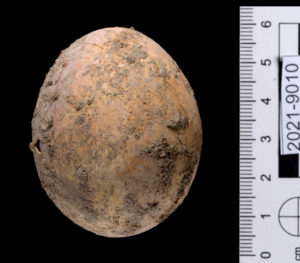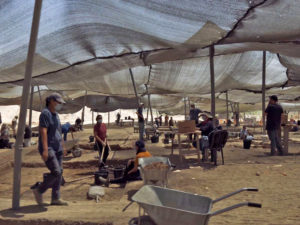In a very rare find, Israeli archaeologists have unearthed a 1,000-year-old intact chicken egg in the central city of Yavne.
Archaeologists from the Israel Antiquities Authority (IAA) were in the midst of conducting excavations on an ancient cesspit dating back to the Islamic period, or roughly the 10th century, when they stumbled across the exciting discovery.
Archeologist Alla Nagorsky, the IAA’s excavation director at the site, told The Media Line that she was stunned when she realized what they had found.
“The first thing I said was wow,” Nagorsky recounted. “I’ve been digging for nearly 40 years and I’ve never seen a whole chicken egg before. Eggs are so fragile that it is nearly impossible to find them intact.”
The egg was uncovered in an area that has been the site of several important archaeological discoveries in recent years. Yavne has been inhabited by various peoples over thousands of years and is considered to be one of the most significant ancient cities in the coastal plain thanks to its proximity to the Mediterranean Sea. After the Romans sacked Jerusalem in 70 CE and destroyed the Second Temple, it also became an important place for post-biblical Jewry.
The ancient egg is from the later Islamic period.
Give the gift of hope
We practice what we preach:
accurate, fearless journalism. But we can't do it alone.
- On the ground in Gaza, Syria, Israel, Egypt, Pakistan, and more
- Our program trained more than 100 journalists
- Calling out fake news and reporting real facts
- On the ground in Gaza, Syria, Israel, Egypt, Pakistan, and more
- Our program trained more than 100 journalists
- Calling out fake news and reporting real facts
Join us.
Support The Media Line. Save democracy.
“We believe that the people living here at the time were Muslim,” Nagorsky explained. “The ceramics, bone dolls and oil candles that we also found are very characteristic of other finds that mark the Abbasid period.”
Together with the egg, archaeologists also uncovered three bone dolls nearby from the same period that were used by children as playthings.
Dr. Lee Perry-Gal, a zooarchaeologist working with the IAA, believes that the egg may have been able to remain whole because it was found in a cesspit and was likely surrounded by a soft nest of human waste.
“It’s hard to believe and it’s a very rare occurrence,” Perry-Gal told The Media Line. “Usually, we find eggshells and there are only a few that I’m aware of worldwide” that remained unbroken.
Even though the astonishing find was removed from the cesspit with extreme caution, the shell was cracked during the process, according to the IAA. However, it was later restored to its original state by a conservationist in the IAA’s organics laboratory. What remains of the yolk has been sent for future DNA analysis.
Although poultry has become a ubiquitous part of the human diet, chickens were originally domesticated not for eating, but for fighting. Humans originally raised fowl for cockfights as far back as 10,000 years ago in Southeast Asia and China.
According to Perry-Gal, the earliest evidence of chickens being kept for food was found in the ancient city of Maresha in Israel, and dates back to the Hellenistic period, or roughly 2,300 years ago.
“Having chickens and eggs in the human diet is very common in the modern world,” Perry-Gal noted. “But in contrast to other species that were domesticated 10,000 years ago, chickens joined the human diet only 2,300 years ago.”
The large-scale excavations in Yavne – which are being carried out under the purview of Dr. Elie Haddad, Liat Nadav-Ziv and Dr. Jon Seligman – are taking place ahead of a planned expansion of the nearby city. In Israel, archaeological excavations are legally required before beginning construction or infrastructure projects. The digs are expected to continue until at least the end of the year.



